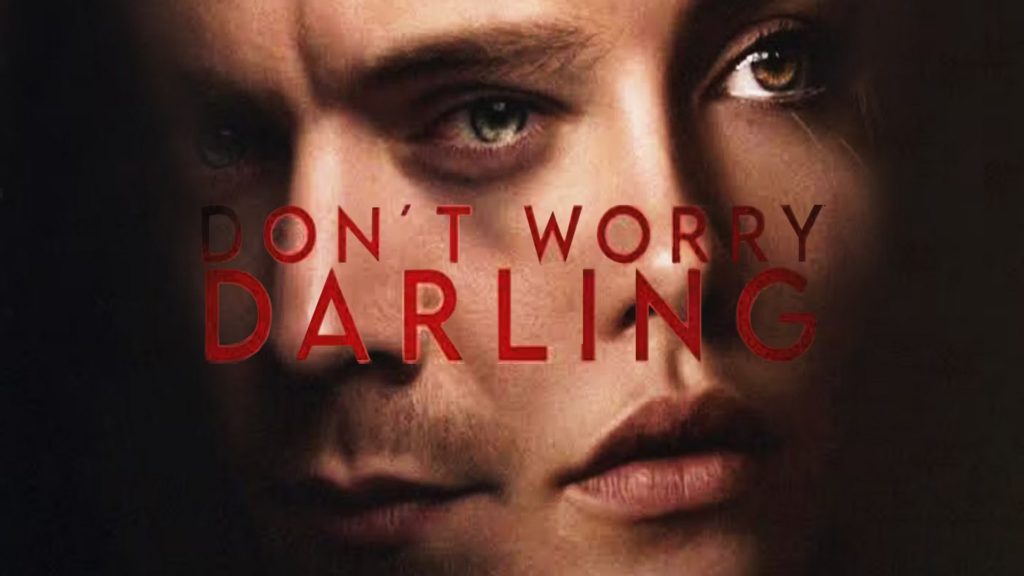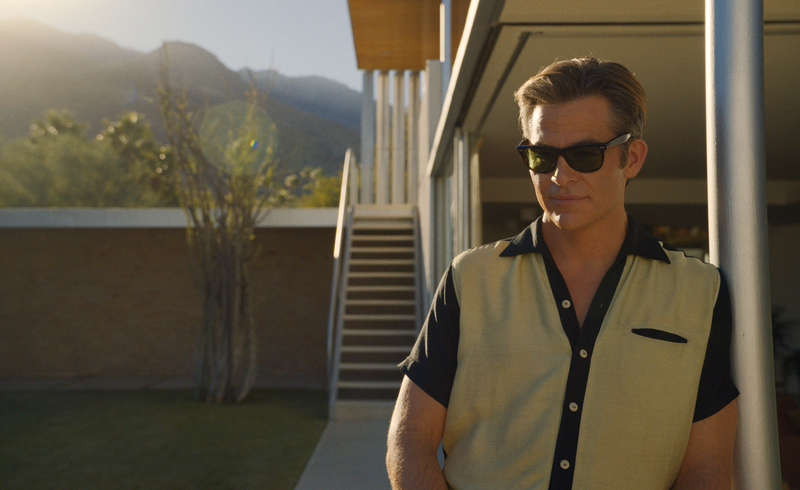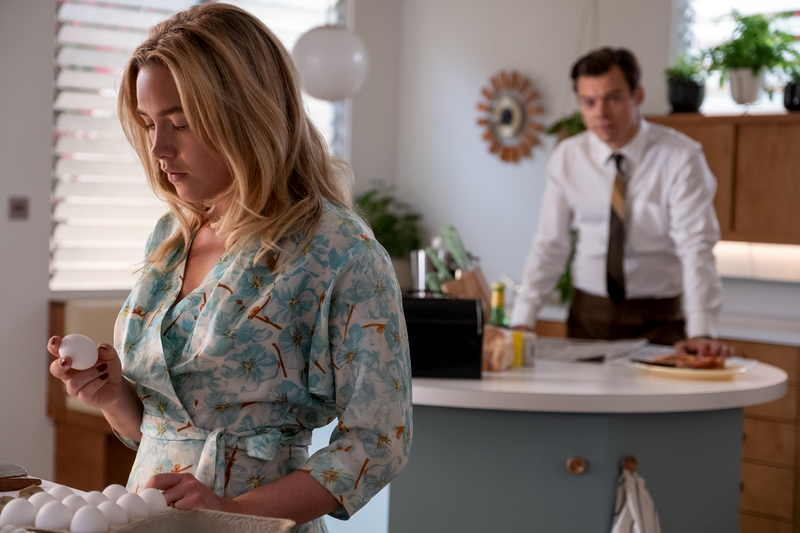
The second film to be directed by Olivia Wilde, Don’t Worry Darling, is a dive into a problematic utopia. A thrilling premise combines through the story work of Katie Silberman, Casey, and Shane Van Dyke, and looks to unsettle the viewer as a near-perfect paradise begins to unravel before our very eyes. Florence Puge takes centre stage in this Warner Brothers production, with Harry Styles in tow for his second major film role.
The 1950’s inspired lifestyle, with houses in close quarters with each other, gave ample opportunity for the community to reveal themselves in the opening act. Clean pressed suits and flowing dresses were a plenty as the neighbourhood drank away into the night. The men were boisterous, and the women were ready to dote on them at a moment’s notice. Alice and her husband Jack were framed as an inseparable pairing and were as infatuated with one another as if the honeymoon never ended. The only chance for them to separate from each other to gather a breath of fresh air was when the men would collectively gather in the morning to drive out into the desert for their secretive jobs that are never disclosed.
With a strong opening and intimate character introductions, allowing oneself to be enthralled with the makeshift utopia felt as inviting as any well-oiled advertisement of the perfect product. Given that it was presented as such, it also invited the self-doubt that often follows after being swept off your feet with a flashing showcase. Each morning followed the same routine that saw the husbands being neatly put together and the wives gathering to see off their man, all before rhythmically throwing themselves in making the perfect setting for their loves anticipated return. Each of these acts is innocent in itself and is by no means a red flag to cook, clean, or be found eagerly awaiting the return of their partners. The presentation of these acts, however, was carried out in increasingly unnatural joy that gave an almost uncanny valley sensation, one that stems from a lifelike scenario that is too perfect to be true.

Florence Puge as Alice offered a window into the psyche of someone who was truly invested in the life, she believed she was living and offered a coat tail to latch onto as her subtle-yet-growing hesitations began to fragment her reality. The brilliant and sharp cinematography was designed to showcase her descent through quick snap cuts, drawing the viewer into the interjected dream-like sequences of synchronous actions that also helped to raise the tension between scenes and continue to provoke questions from the audience. With ominous and often intrusive soundtracks that were paired with humming, strong breathing, and world-shaking tremors, the atmosphere of the bubbly community set in the middle of the desert began to feel wrong and uncomfortable.
As much as I enjoyed the initial introduction, the premise that something was wrong was easy to invoke, but it offered little to remain invested with. After the downfall of her neighbour Margaret, played by KiKi Layne, who seemingly lost her mind to the idea that there was something wrong, Alice was subjected to severe gas lighting when her experiences led her to believe Margaret, and the problematic behaviours of the time the movie is set in continued to hammer her outbursts with a demand to simply conform.
Chris Pine’s character, Frank, the founder of the Victory Program and ritualistic cult leader type was an easy target to focus your disdain on, and the problem, I feel, was how long the movie dwelled on the fact that something was wrong for the sake of being wrong, without offering anything to go on until far too late.

A paper-thin final act expected viewers to just accept the wild notion that just dropped a bag of problems and questions into our laps with hopes that the climatic actions would make up for the shortcoming of a proper explanation. Yes, the performances of the characters tipped the scales of emotions to allow for the pent-up tension to be released, some more than others, but there wasn’t ample opportunity to showcase much growth outside of Alice though.
With the highlighted misogynistic themes of the film front and centre, ultimately, there was no resolve, which I understand is a real-world problem most still face, I just felt they were leading to a particular message that never came.
Alice was a fitting name as we followed her journey through the terrifying wonderland of the Victory Project. Through intense and purposely uncomfortable cinematography, Don’t Worry Darling will grip you early with the colourful 50’s utopia setting and intriguing premise. With an emphasis on the portrayals of the characters and having a layer of caution to the wind mentality in mind, I was able to escape reality myself for the entire run time.

The Good
- Florence Puge showcases all levels of distinct emotions and was easy to follow their journey
- The set design of the 1950’s rarely faulted and maintained the same level of authenticity
- Haunting sound design, ominous and uncomfortable soundtrack interjected effortlessly
- Synchronous behaviours to unsettle the viewer were presented in a clever and well-timed manner
The Bad
- The film’s tension ended up working against it as the intrigue faulted before the reveal finally happened
- The profound messages of gaslighting and misogyny were presented with an intention to convey a message, that never came
- Vague final act offered little pay off and the questions left behind only poke hole in what came before








